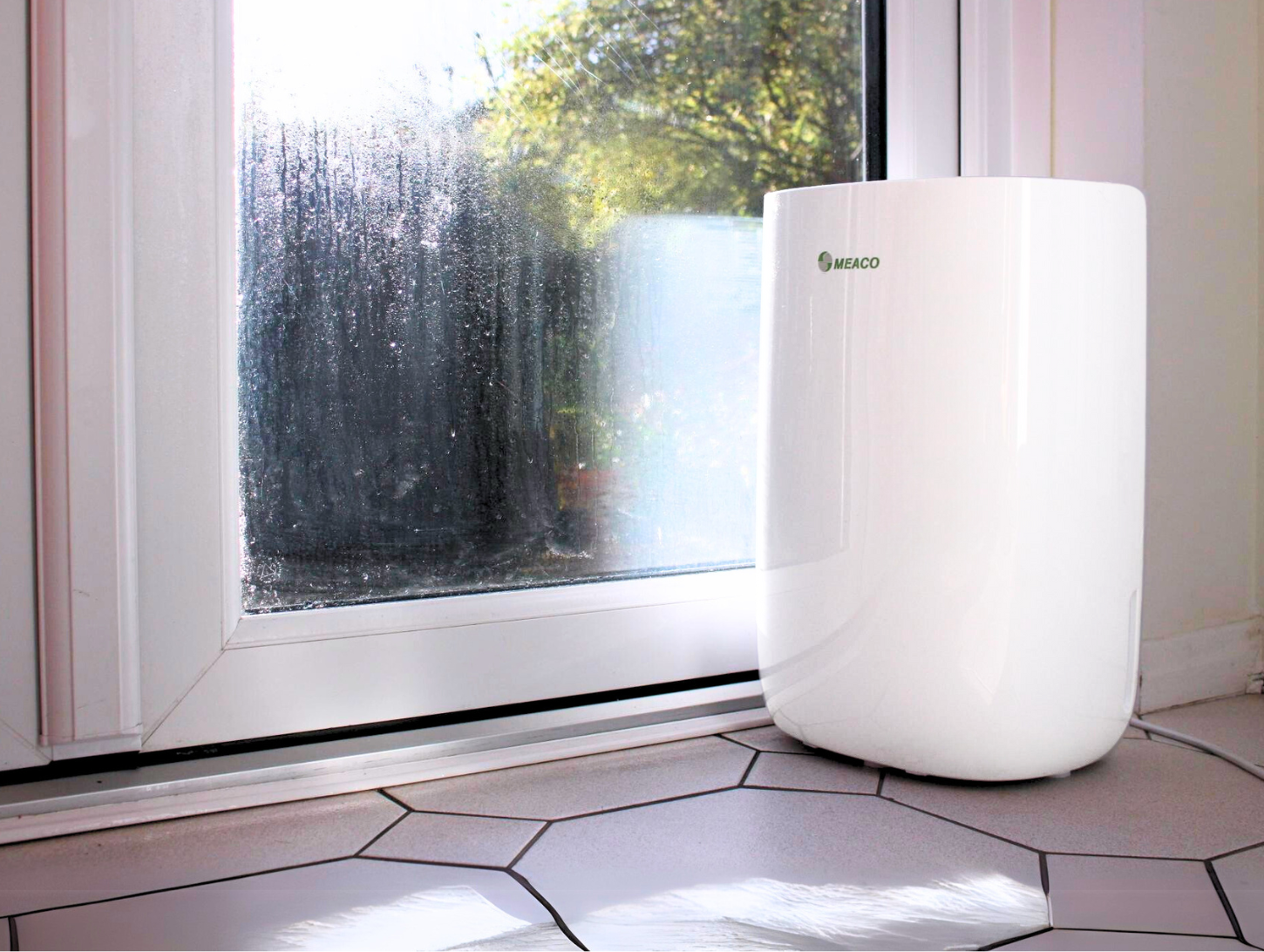
With the cold, there’s also condensation. When the temperature drops outside, generally below 5°C overnight, you’ll start seeing condensation on your windows. You may notice this most in the bedroom, kitchen, bathroom or conservatory, especially early in the morning. Stopping condensation is one of the biggest problems homeowners face.
So, how can you stop condensation? The two main approaches to ‘curing’ or ‘stopping’ condensation are either to open the windows or use a dehumidifier. Open the windows may give pretty instant results but we’re letting in the cold air and then paying to heat it back up. Dehumidifiers provide a fast, effective and cost-efficient way to manage condensation.
Opening windows to deal with condensation
You would probably expect me to recommend that you buy a dehumidifier. I am a dehumidifier manufacturer after all. But let’s look at the benefits of opening windows first.
In Germany, they call it “Stoßlüften”, meaning “shock ventilation” and they may have the right idea about things… When people worry about condensation or mould problems, the advice will often be to open the window. This is to improve ventilation.
However, in some older properties that are often quite ‘leaky’, we can see that condensation is rarely an issue. I mean that in properties with older windows, we don’t always see more condensation. These windows might let in some moisture and may not be fully draft-proof. However, condensation is about trapped moisture inside the house, not extra moisture coming in.
Opening windows can cure condensation – but do you want to let the cold in?
So why does ventilation help? Opening windows can stop condensation – but do you want to let the cold in?
First, what causes condensation on windows?
Essentially, condensation occurs when air meets a cold surface and forms water on that surface. And it’s all about the relationship between relative humidity and temperature. In most cases, the surface is the cold glass panes of your windows and the relative humidity is moisture within your home. It doesn’t matter how little moisture there is in the air – if the surface is cold enough, you will get condensation.
Your windows provide the perfect cold surface because they are in direct contact with the chilly outside. If you touch the window pane, you’ll feel the difference!
This is why my windows at home have been free of condensation for months. Now the temperature has dropped, I can suddenly see condensation. I doubt that the amount of moisture in the air in my home has increased. It is just that the surface temperature of the window is lower during a cold spell.
This is also why you’ll find double-glazed windows usually have less condensation than single-glazed ones. This is because the two panes form an insulated barrier. And as a result, the inside pane isn’t quite as cold and condensation is less likely to occur. Remember that double-glazing condensation can still happen, it’s just less frequent than single glazing. This does not mean your windows are broken but there are steps you can take to reduce it.
What is the science behind condensation: the relationship between humidity and temperature?
Condensation forming on cold surfaces happens because of the inverse relationship between temperature and relative humidity. As temperature falls, relative humidity increases and as temperatures increase, relative humidity falls. So if you heat air up, the relative humidity will decrease. This is the key to the reason why ventilation can help cure condensation.
So, there are two things helping to form condensation, the temperature of a cold surface (your windows) and relative humidity. Of these, which can we control in order to stop condensation?
Unless you have fancy heated windows, then the answer is relative humidity. You can do this in a few ways. Let’s start with opening the window.
Does opening the window stop condensation?
Ultimately, yes. You’ll quickly notice the condensation leaving the windows. The air in your home is full of moisture from cooking, bathing, showering, drying washing and even breathing. The air outside in winter will probably have a lower relative humidity. So when you open the windows, warm, damp air goes out and cold air comes in.
Condensation can build up easily on any cold surface, especially windows throughout winter.
But now your room is a lot colder and you don’t know whether the outside air has changed your room’s relative humidity.
Have we helped to reduce the condensation situation? The answer is still yes. If you’re having a hot shower and open the window a smidge, you can watch the condensation reduce dramatically.
It is also because we are not going to let the air stay cold. We will heat it up to a temperature that we are comfortable with.
Even if the air outside is freezing, I still want it to be about 20°C in my house but I’ve opened the window and let some of that cold air in. I will warm it up and I’ll turn the heating on.
And in the laws of science, increased temperature means decreased relative humidity. If we assume the incoming air is full of moisture, warming it up will reduce that relative humidity as well. Let’s say the incoming air has a relative humidity around 90%rh, increasing the temperature will reduce it down to something like 25%rh.
So, all is good! We have got rid of our warm damp air, replaced it with cold damp air and warmed it up. We now have warm dry air. There’s a cure for condensation.
Opening the windows will work and is an effective solution to condensation control.
But..
Think about what we have just done. We have heated the air, costing us money, and then we have thrown that heated air out of the window. It might have been easier to throw fivers into the street!
To replace it, we have introduced freezing cold air into our home and made ourselves feel very uncomfortable.
Now, we need to warm the cold air. This will help us feel comfortable again and lower the humidity. This costs more money in energy, and later in the day, we’ll have to do it all over again. In fact, ideally you will have to do this in every room in the house. You will certainly need to do it in the bathroom, kitchen and bedrooms at the very least.
Opening the windows does work but I am not a fan because of two reasons. One, it makes people feel uncomfortable. Secondly, there’s a huge hidden cost of reheating the fresh air coming in from outside. With energy bills skyrocketing it seems a real waste of money to keep on throwing the energy outside.
Is a dehumidifier a better way to stop or prevent condensation?
Yes, a dehumidifier is a superb way to manage relative humidity in your home and reduce condensation. Plus, a dehumidifier is the only way you’ll remove moisture. As we mentioned earlier: condensation occurs because of temperature and relative humidity. You are unlikely to control the temperature of your windows, but you can manage relative humidity with a dehumidifier. Making a dehumidifier an incredibly effective choice to prevent condensation.
Running a dehumidifier does of course have a cost to it. There is an initial price of the unit, and then there’s the electricity cost to run it.
But there is an important difference between the cost of running a dehumidifier and the cost of heating air.
MeacoDry ABC Dehumidifier extracting excess moisture and preventing condensation from occurring
- Some dehumidifiers create a little warmth while dehumidifying. Desiccant dehumidifiers create around 12°C which is ideal especially in garages and conservatories.
- If you’re opening the window and running the central heating, you’re potentially throwing hundreds of pounds away every year. The hot air often escapes through the window. You will just heat it up again later when you open another window.
- Finally, heating dry air is actually a lot cheaper than heating damp air. Read more: 7 Ways to Stay Warm, Save Money, and Delay Turning the Central Heating On
We use our dehumidifiers mainly in the winter when condensation is at its worst. It’s freezing outside which provides the perfect cold surface on your windows to condensate. And we are closing the windows and doors, trapping moisture in our home. This is the perfect recipe for condensation.
In the winter, it is cold and we need to heat our homes. The energy used by the dehumidifier is returned to the room that it is standing. And that energy is in the form of warmer air.
So the cost of running a dehumidifier is retained within your home. If you have a radiator within the same space as the dehumidifier, you can turn it off – helping to keep your energy bills down. So where is the cost of running the dehumidifier if you are benefiting from and enjoying the heat that it generates?
Read more: How much does it cost to run dehumidifier units? Less than you think!
How do deal with condensation in a conservatory
Condensation in conservatories is a hugely common problem for homeowners. It’s a room of windows, creating that perfect cold surface. It’s unheated so we’re not reducing the relative humidity by increasing temperature. And it’s just as likely as the rest of the house to contain moisture.
Both solutions work well for reducing condensation in these spaces: opening windows and running a dehumidifier. But if you want to proactively prevent condensation in a conservatory? My best recommendation is to manage your relative humidity with a desiccant dehumidifier.
Read more: How do I prevent condensation in a conservatory?
A dehumidifier is a fast, effective and cost-efficient way to stop condensation. Opening the windows may seem to be the easy – and free – solution, but it’s not quite as cheap as it looks!
We recommend…
- Compact and stylish dehumidifier
- Quiet Mark – from just 36dB
- Eliminates moisture – ideal for damp, mould and condensation
- Shop now
Meaco Low Energy Dehumidifiers
- Low cost to run – 4p / hour based on 24.50p / kWh
- Quiet Mark Award – up to 41 dB
- Tackles damp, mould and condensation
- Shop now
Meaco DD8L Desiccant Dehumidifier
- Superb at removing condensation from windows
- Desiccant dehumidifier
- Provides additional warmth & offers high performance
- Shop now
Browse all dehumidifiers.

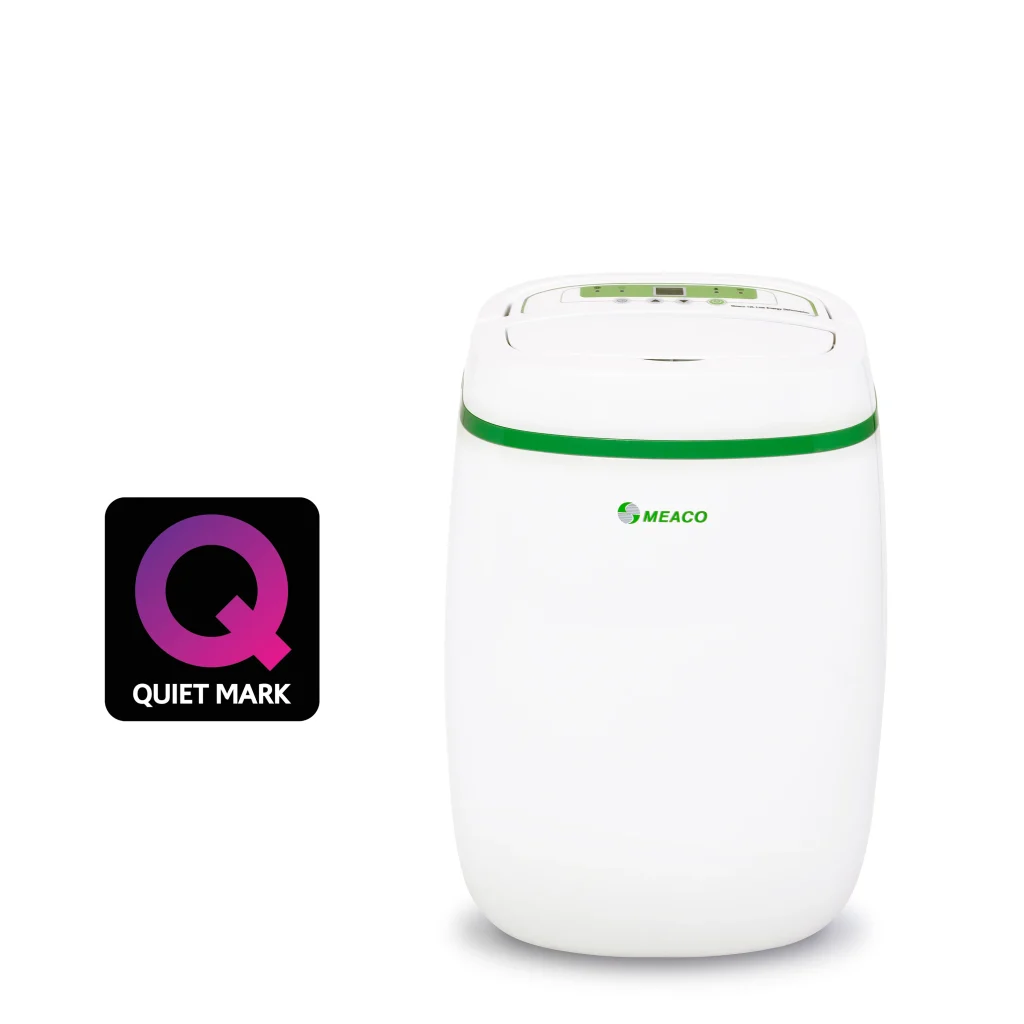
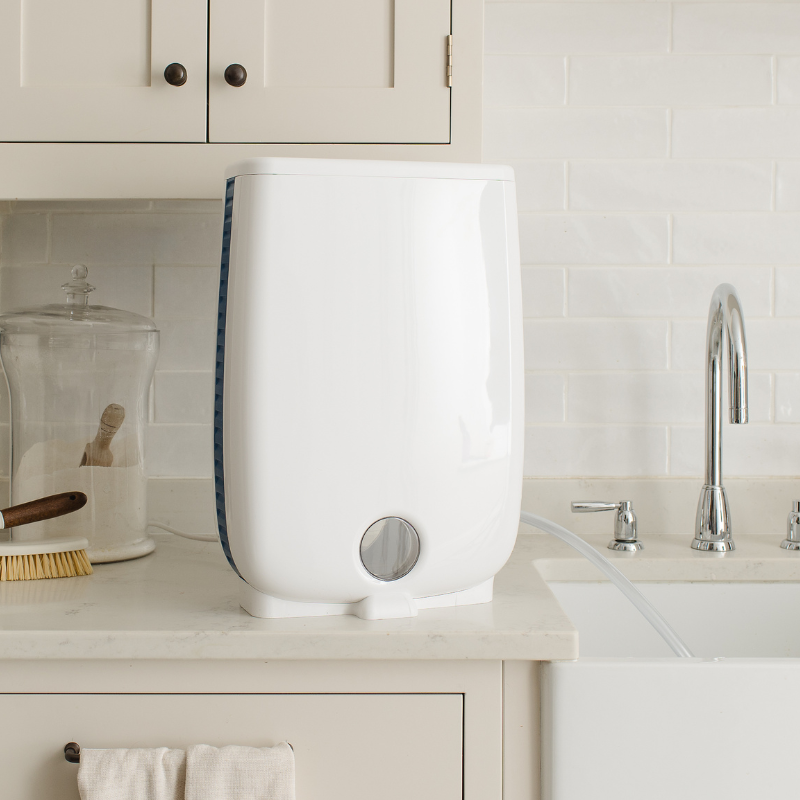
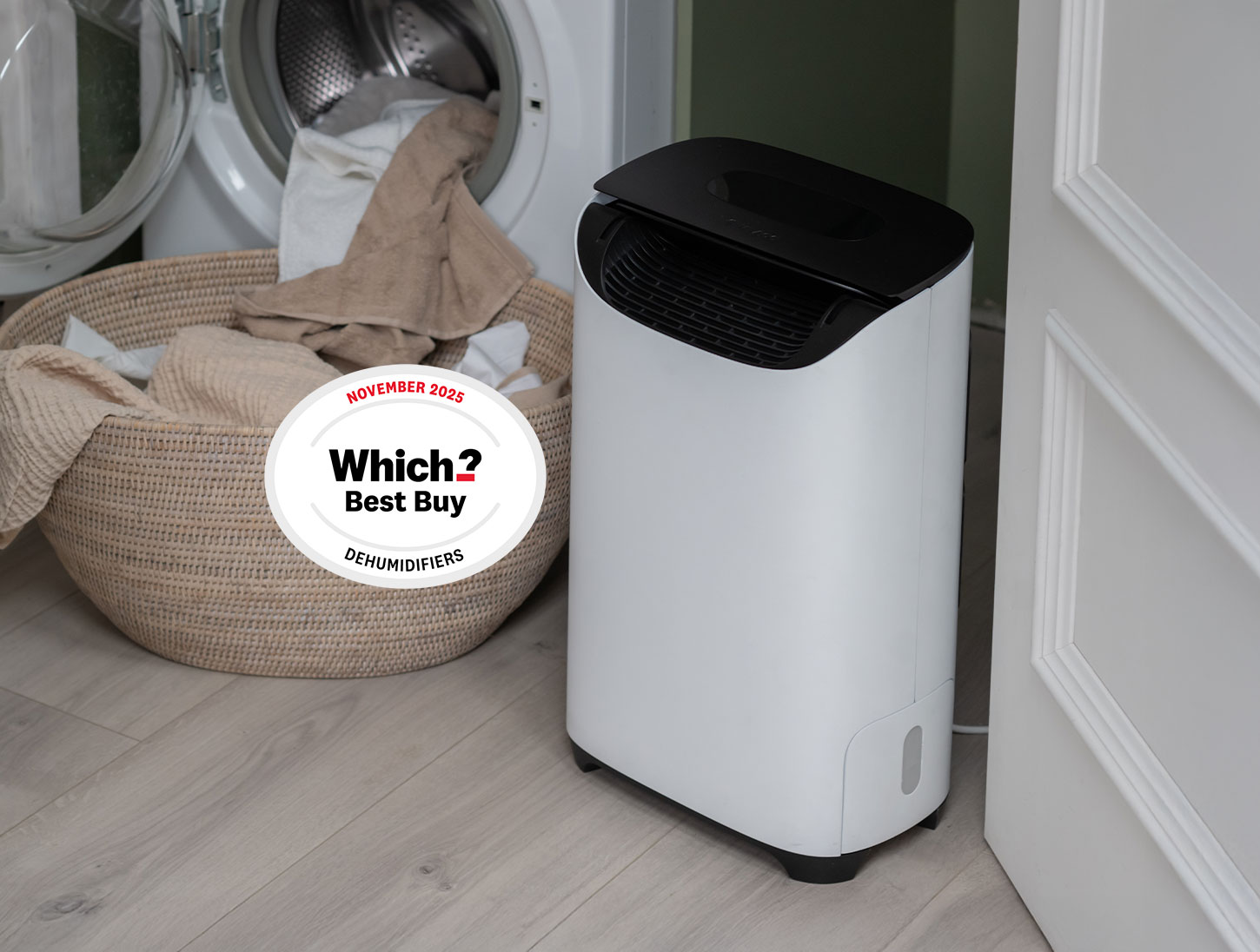
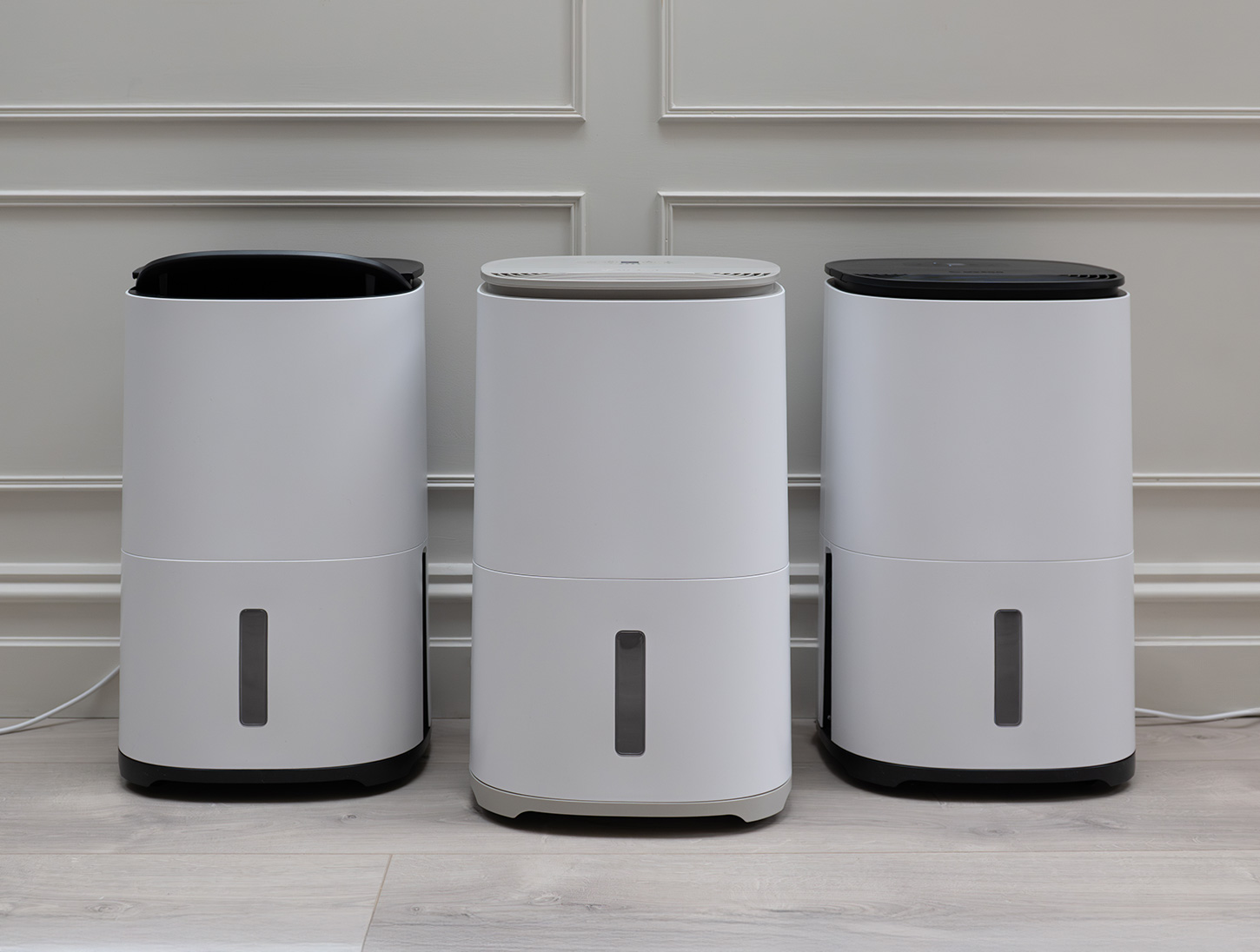
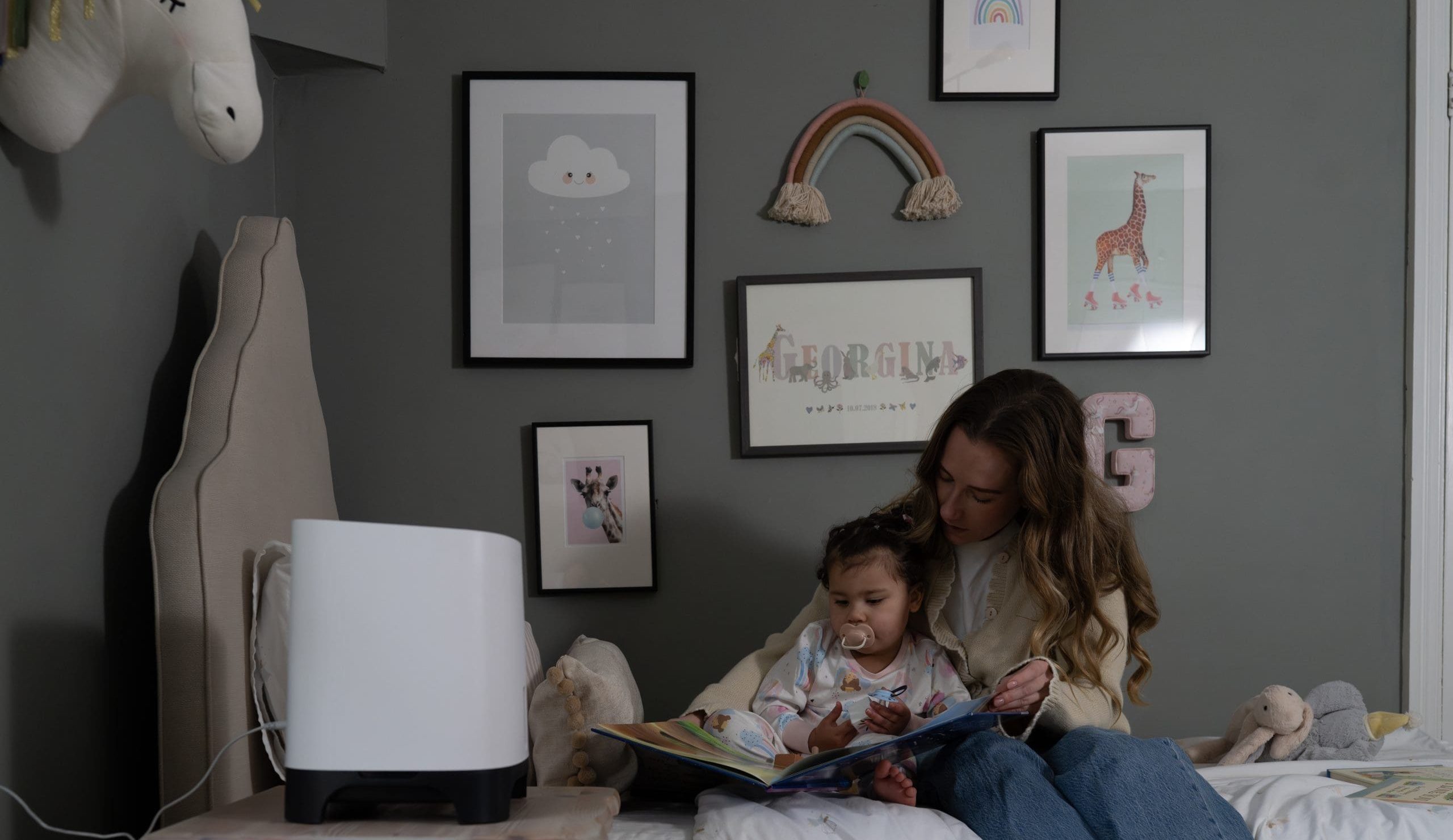



215 responses
Hi Chris, 2 out 3 bedrooms have mold on the walls both are external walls I have washed the mold off and purchased dehumidifiers for both rooms
Pro Breeze® 500ml Mini Dehumidifier
Every few days the tank gets filled by 250ml or so. Do i continue to keep it on 24/7 or shoukf I turn off and open the windows when I can? Also I’ve moved the beds away from this area so nothing is touching the wall, how do I know of this is serious and need to call someone In? Can you advise what professional it would be that would need to check the external walls?
Thanks
Vina
Vina,
Sounds like you need a proper dehumidifier, the small peltier dehumidifier you have will never do the job. Go for a 20L low Energy model dehumidifier and just put it somewhere central in the home and leave all the internal doors open and you will notice a massive difference.
regards
Chris
I run my dehumidifier 24/7 from autumn on. It collects a full tank every day at least. The heating is on for 1.5 hours am and 5 hours pm going off about 9.16pm. When it is very cold I still get a lot of condensation on the windows when I wake ( 8.30am ish)
I have metallic venetian blinds and thick lines curtains, I leave all the internal doors open in my bungalow and there is only me.
Cold mornings, I wipe it away, but it starts to build up again, then drys off. Why is this, and can I stop it. thanks, Polly
Pollyanna,
Thank you for your question. This is probably a reflection of the quality of the windows because condensation is a result of air hitting a cold surface. If the air in the house is dry from the dehumidifier then the windows would have to be pretty cold for condensation to happen. This is more likely with older or single glazed windows.
Leave the blinds/curtains open during the day so that the air can circulate around the windows and think about where moisture comes from in the house and if you can reduce the amount of moisture in the air by using extractor fans in the kitchen/bathroom or opening windows for 15 minutes after cooking/bathing.
Hope this helps.
regards
Chris
Hi Chris, We moved into a house 5 years ago with a loft conversion already done with a loft space each side of the room. On 1 side of the loft space we seem to have condensation coming down the room ceiling and dripping into the loft and also on the loft ceiling. Do you have any tips which could help us out? Would a dehumidifier work ?
Look forward to hearing from you.
Gary,
Don’t buy a dehumidifier to solve issues in the loft! The problem is that hot air is rising up from the house and hitting the cold underside of the loft. So you have to stop the hot air from rising (more insulation on the loft floor) and warm up the underside of the roof.
If you have condensation on the windows in the actual house then a dehumidifier is a sensible investment to help with that.
regards
Chris
hi chris i have been having problems with condensation on my windows. i do have a whole house dehumidifier hooked up to my furnace when it gets to about 20 degrees outside the dehumidifier does not keep all the condensation off of the windows. humditiy in the house with the dehumidifier going is about 31% it runs non stop on high all day and never shuts off . i run bath fans,dryer vents good, and did everything everybody recommends to do. dont know what else to do because my dehumidifier doesnt cure the problem once its below 20degrees. when it gets that low i turn on fans directly to every window. kind of a pain but better then mold. hope you can give me some info. my whole house dehumidifier takes about 90 pints out a day is what the unit says on it about 1900 sg ft on main floor and 1400 in basement. thanks matt
Matt,
I am guessing that you are in America. Two questions first – are the windows double glazed and how do you know that the humidity is 31%rh?
Chris
Hello. I have condensation on cold days in every window of my house, and on one of the corners in my bedroom. Will a dehumidifier help with this problem?
Tom,
That is exactly what a dehumidifier does do and just the sort of problem it will solve. use this guide to help you select the correct dehumidifier for your size of house.
http://www.meaco.com/which_dehumidifier_is_best.php
Chris
Hi Chris, I am getting a lot a condensation on windows throughout my 2 story – 3 bedroom house. I have been drying the windows each morning and was wondering if you would recommend a product that would solve this?
Keith,
Depends on how you dry your washing, the guide below will help you to select either the Meaco 10L or the Meaco DD8L. If you would prefer to chat to someone then please feel free to call the office on 01483 234900.
http://www.meaco.com/which_dehumidifier_is_best.php
Chris
Hi Chris
condensation and dampness in my home are driving me mad! Lived in house for over 10yrs with this problem. The worst room is the living room. It often has a mouldy smell in mornings. over the years, I’d dry off windows each morn and air the place. Mould did occur in patches on walls under window and if ever a cushion was left again it – the fabric would be wet. The back of a sofa also had mould on it. This year I painted walls with a special insulating paint. The walls feel much warmer and the room (so far) doesn’t feel as cold but the condensation on window is now way worse. The end of window blinds are now sitting in puddles of water on window sill each morn. Thanks for all advice on this page – the dehumidifier sounds like my solution but if I was to upgrade to better quality treble glaze windows eventually – would the problem still happen do you think?
Agnes,
Whether condensation forms and whether mould grows depends on the relative humidity in the air and in the case of condensation the surface temperature of the windows/walls as well. We have had a very mild Autumn to date which has meant that the majority of people are reporting greatly reduced levels of condensation and mould so far this season because surface temperatures are higher. This will all change when temperatures drop to more like the average for the time of year. When this happens you will be able to see whether your paint has been succesful or not.
The only sure fire way of remove excess moisture from the air is to use a dehumidifier, all other methods are either warming the room air up or increasing the surface temperature of the windows or walls. Installing cavity wall insulation and better quality windows is sensible because it does help to keep the house warmer in winter and cooler in summer, but the level of moisture in the house will remain the same. High moisture levels will still mean higher heating bills and mould will still grow.
So yes a dehumidifier is still the most sensible investment for you and you should notice a massive difference within a couple of weeks. If you want more help then feel free to reply again, email me via chris@meaco.com or call the office on 01483 234900.
lt me know what happens.
Chris
Hi Chris, we have a problem with severe condensation on all windows particularly now as the temperature is changing. There is some black mold on 2 of the bedroom walls, and whilst we run a dehumidifer overnight for approx 9 hours the problem is still there. Is there anything else we should do?.
Shaun,
Sorry to hear about your problems, you might be relieved to hear that you are not alone, thousands of people have the same problems. I would suggest running the dehumidifier 24/7 with the internal doors open to allow the air to circulate throughout the house. For a few days run the dehumidifier in the effected bedrooms to give them a good drying out, the walls effected are probably north facing and a colder than the rest of the house, hence the mould. Once the dehumidifier has been running like this for a few days you can then start to think about cleaning off the mould.
Whenever you cook or shower open a windowfor ten minutes or so to get rid of some of the moisture and then keep the windows closed and let the dehumidifier deal with maintaining a balanced relative humidity. Make sure that you clean the filter on the dehumidifier once a weelectronic to keep the dehumidifier in optimum condition.
If you have any extractor fans make sure that you use them and keep them clean as well.
Hope this all helps, feel free to let me know.
Chris
Hi Chris ,
From reading some of these comments I feel you are the man to ask about my mold issue!
Every year without fail the colder weather comes and I start to see mold growing in my bedroom mainly on the back of my free standing wardrobe and draws and also on shoes with a fabric material and around the window seals.
I open the window every morning to ventilate the room, and also try to leave the window open slightly at night. I also use a dehumidifier which I run all day. I do try and leave my bedroom window open even if this is slightly for most of the day.
Am I doing this wrong? Should I be closing the window if I am running the dehumidifier all day? Or open the window at intervals? Nothing I am doing seems to help the situation every year unfortunately. Any help would be appreciated , thanks
Natalie,
Best to look at it from a different perspective, where is the moisture coming from. Look at sources of moisture in the home and try and cut down on these. For example when cooking do you put lids on the pans and turn on the extractor fan? If there is no extractor in the kitchen then open the window for a while after cooking. Is there an extractor in the bathroom, again do you open a window after showering? How does the washing get dried, if on a clothes horse then do this in a room with the dehumidifier to stop the moisture from spreading around the house.
In the bedroom try not to have furniture or clothes touching outside walls, always maintain a gap.
Leave all of the internal doors open so that the damp can get to the dehumidifier with the machine running in a central location. Run it 24/7 set to a target humidity of 45%rh and make sure that it’s filter is clean.
Outside, are there any cracks on that water, can water get into the wall when it rains? Same around the window.
Hope this helps.
Chris
Hi Chris
Hope you can help we have been living with problem condensation now for 6 years when it comes to October we start with condensation on the windows then as we get into winter it goes on to the walls and we get black mould and what looks like fur on the really cold walls I keep the windows open on a morning to get rid of the moisture then I put the dehumidifier on a afternoon and the tank will be full by the night the dehumidifier has improved the problem a little should I be using a another dehumidifier downstairs any advice please it is a old house with double cavity on the bottom of the house but solid wall on top half. Also myself and son have now got asthma since living here.
Paula,
Thanks for your comment. I would suggest making sure that you ventilate when you shower and cook, use the dehumidifier to dry the laundry if you dry washing on the clothes horse and run the dehumidifier all day and all night with the internal doors open to allow the air to circulate. This should improve things and then you can decide whether you need a second dehumidifier.
Hope this helps, let me know how you get on.
Chris
Hi Chris I’ve got a lot of condensation on my windows in the conservatory & utility ,which as got 30 & 10 windows in them ,the roof is now a solid one,we have blinds on all widows ,the heating is not the best , one long radiator in the conservatory,which is 24ft by 10ft,& small oil radiator in the utility, which is 9ft by 9ft ,which are in closed by doors , we have just ordered a meaco dry abc 10 litre yesterday,the question is will it be any good.kind regards Ken Speed,just to say I left the blinds up in the utility last night & looked a lot better .Ken
Ken,
It will be fine, just let it run on 45%rh and let it go. Having the blinds up will helpo a lot. It will collect most of it’s water during the day and it will make a difference.
Chris
Hi Chris ,
Hoping you can answer a few questions for me
I live in a 3 bed semi detached bungalow and we have alot of condensation on our windows in the colder months , they are good quality double glazed and the most condensation is obviously on me and my wife’s bedroom window easily half way up the window and this year I noticed alot on my smaller lads windows probably due to the fact he is getting bigger and his room is smaller. The other windows have the usual 3 inches of condensation. Also I have a bathroom and kitchen extractor and we never dry clothes on radiators.
I’m really stuck between buying a good dehumidifier or a piv system , I have been researching both and both have great reviews in terms of getting rid of the condensation. So my questions are
Which do you think is best and why ?
Are the dehumidifiers built to run 24/7 for say 6 months of the year ?
The abc silent one sounds great as I need a quiet one with it being positioned outside the bedrooms in hall but id love the one with the hepa filter model but this model makes more noise does it ?
I have another meaco dehumidifier (can’t think of model as I’m currently in work) that we have used for years to dry our clothes in the utility and it’s been of great service but this version makes too much noise to place outside the bedrooms. I understand we insulate and make our homes too air tight these days so don’t have enough ventilation so I’m looking for the best long term solution as hopefully this is our forever home .
Thanks Dave
A 12 litre dehumidifier on the landing will make a big difference and none of them are very noisy. The problem that I have with a PIV system is that it is based on forcing heated air out of the house and bringing fresh air in. This costs money because you have to continuously heat fresh air and throw heated air out of the house. It seems like a waste of money to me. A PIV only works when the outside air is colder than the inside air, it will therefore not be as effective in summer or on a warm autumn like the one we are having now (and you are struggling with).
Any of the machines will be happy to work 24/7 but the humidistats will control them so they will not have to work that hard.
Hello, I came across your page looking for solutions to condensation on windows. The two bedroom apartment we rent is HORRIBLE for condensation. Its so bad we’ve migrated from the bedroom to the living room (as in our bed is IN the living room now, we’ve abandoned the wood floor bedrooms entirely and use them for storage).
There is a large window in the living room that gets very wet when we run the heater. Would a dehumidifier solve the issue and also would it be harmful to our cat? Thanks in advance.
Dehumidifier will help a lot and will not harm the cat. If the heater is a bottled gas style heater then that is where the moisture is coming from and it will be the cause of the issues. Otherwise always run your extractor fans, open windows after bathing, showering and cooking and use a dehumidifier to dry the laundry.
Chris
Hello, I live in a doma bungalow and in my front bedroom my condenstion is really bad. I have alot of condention on my other windows but more so on my bedroom one i have brought a demidefer and there was loads of water in the bucket… Do i have to keep this on all the time thought winter? I sleep with the window open a jar and this redues it but when i forget to open its there again:( the wallpaper under the window has started to left also :(.. I moved into this property late spring this yr.. I have only seen 2 air bricks that is under a patio door at the back of the property and around the rest of the property have air blocks which i can not find anywhere on the net abt them :/…. My windows in rooms we use are fogged not just a little at the bottom like most i read about. Any help on this would be great has it is really doing my head in 🙁
Toni,
Sorry to hear about your problem. Put the dehumidifier somewhere central in the property and run it 24/7 will the humidistat set to a mid point setting. When you shower and cook try to ventilate either with an extractor fan or by opening the windows. If you follow this advice then you will find that things will improve.
Let me know.
Chris